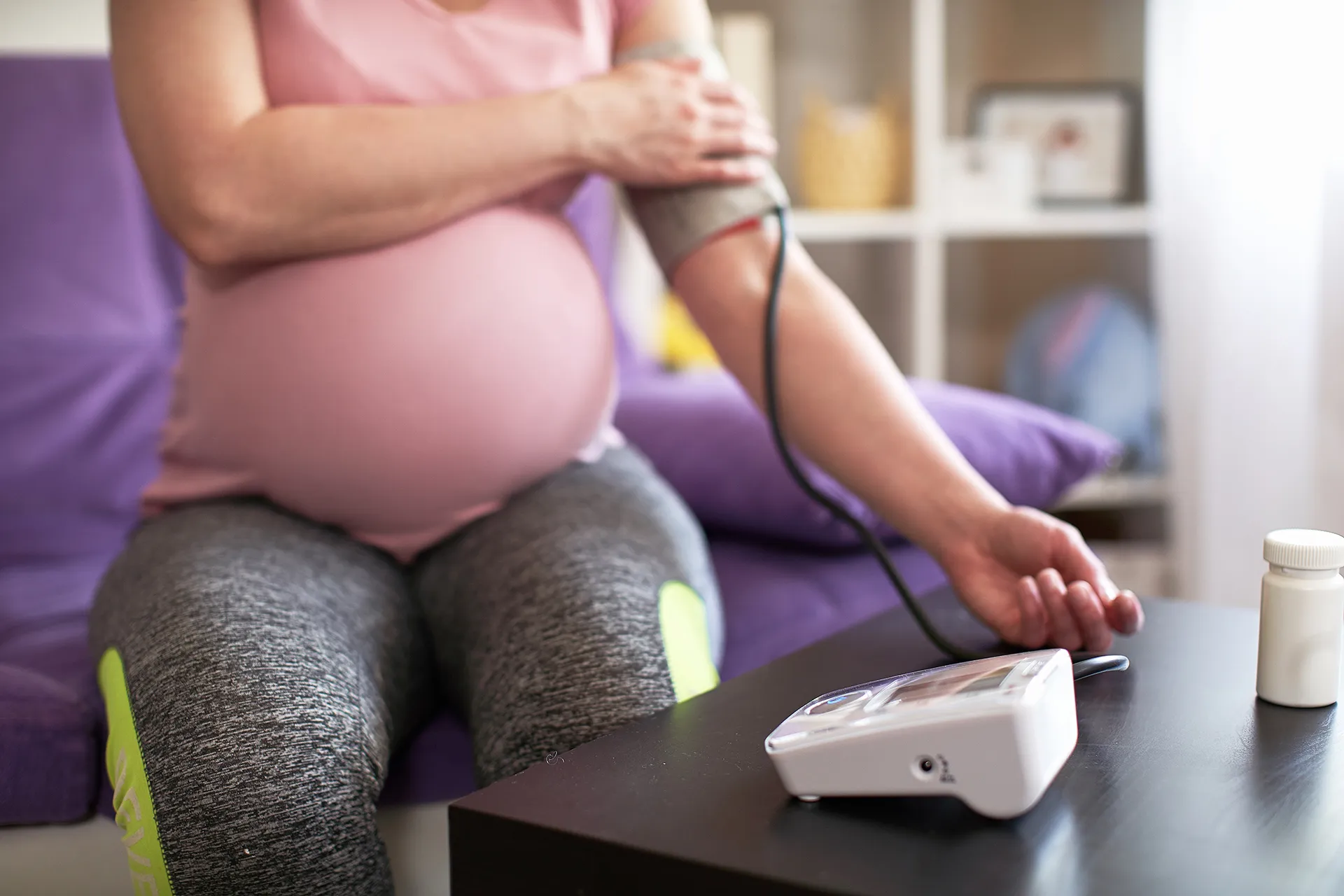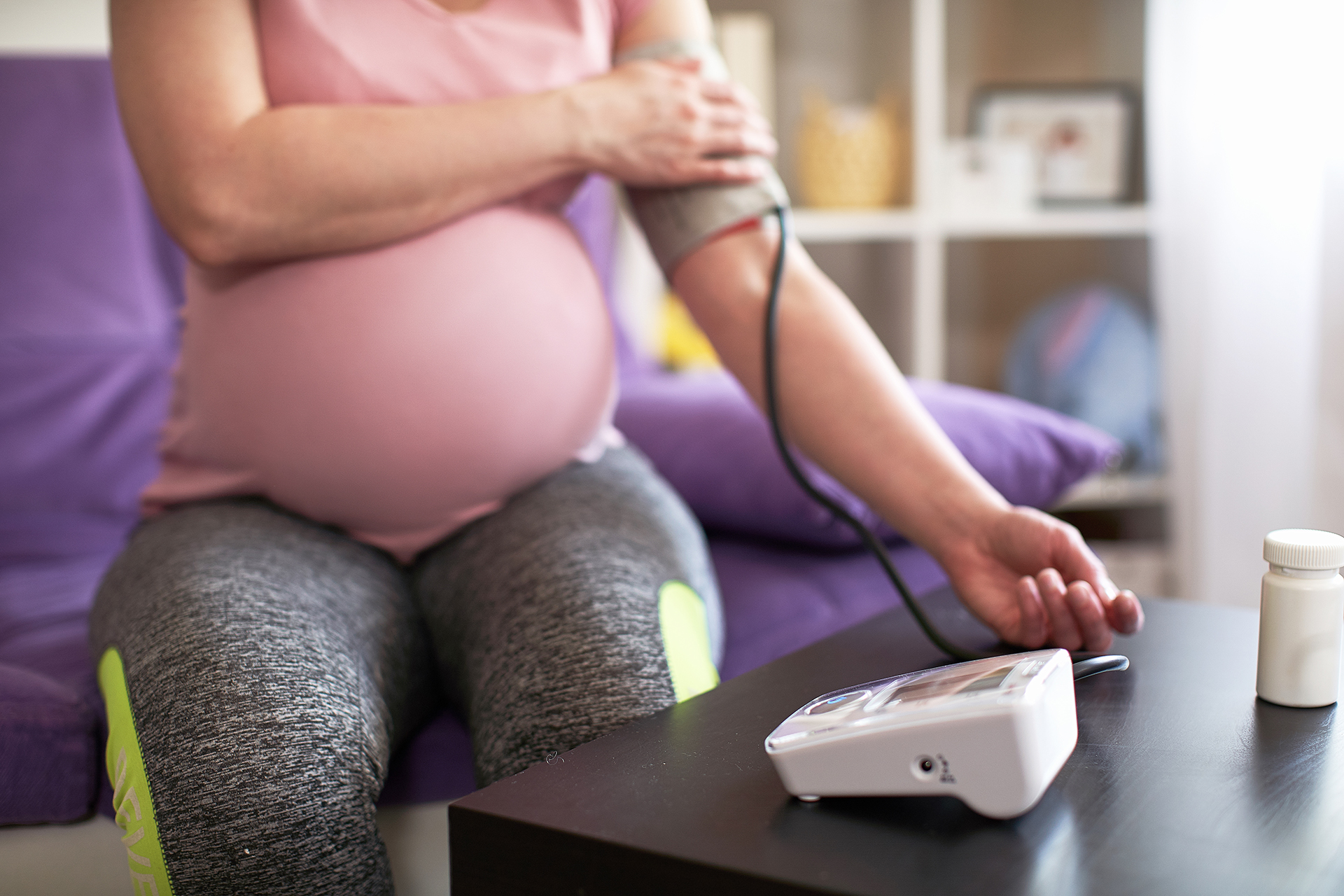Hypertension | 5 min read
Pregnancy Induced Hypertension: Causes, Symptoms, Types
Medically reviewed by
Table of Content
Key Takeaways
- Hypertension during pregnancy can be dangerous for both mother and baby
- Pregnancy induced hypertension can result in pre-term birth and organ damage
- The best way to address high BP during pregnancy is regular screening
When you are pregnant, your doctor schedules regular check-ups to catch any abnormalities at the earliest. This is the key to having a smooth pregnancy and ensuring that you and your baby are healthy. One of the things doctors check at every appointment is your blood pressure. High blood pressure or hypertension in pregnancy can be a cause for concern. It poses the risk of certain complications. That said, early diagnosis can help control it effectively.
So, learn more about high blood pressure and pregnancy, and about management of hypertension in pregnancy.
Causes of Pregnancy Induced Hypertension
There are several reasons why you may suffer from hypertension when pregnant. Here are a few of the most likely causes of hypertension in pregnancy.
- A family history of high blood pressure or pregnancy induced hypertension
- Being overweight
- Being over the age of 35 years
- Having multiple babies at once
- Being pregnant for the first time
- Having diabetes
- Suffering from autoimmune diseases
- Not exercising or being active
- Smoking and consuming alcohol
- Having high cholesterol
- Having a pre-existing kidney disease
- Having had a previous pregnancy with hypertension
Complications of Pregnancy Induced Hypertension
There are several problems that high blood pressure can trigger. Here are the most important ones that you should know of.
1. Preeclampsia
Preeclampsia is a complication that occurs due to high blood pressure. It is a serious condition that can damage organs such as your liver, brain or kidneys. As preeclampsia can be fatal to your and your baby’s health, the best way to address it is to deliver your baby early or take certain prescribed medication.
2. Insufficient Blood Flow to the Placenta
When you have chronic hypertension in pregnancy, it is possible that your placenta doesn’t get adequate blood supply. This means that your baby won’t get the right amount of oxygen and nutrients. Apart from hampering the baby’s growth, this can result in low birth weight, infections and premature birth.
3. HELLP Syndrome
HELLP syndrome is a possible complication of preeclampsia. Here HELLP signifies hemolysis, elevated liver enzymes and low platelet count. HELLP syndrome can be fatal for the mother and the baby.
To avoid the complications of pregnancy induced hypertension don’t take high blood pressure lightly. Visit your doctor and follow his/her advice.

Signs and Symptoms of Pregnancy Induced Hypertension
High blood pressure and pregnancy is a deadly combination. To tackle it immediately, watch out for these symptoms of gestational hypertension or pregnancy induced hypertension.
- Blurry vision or double vision
- Frequent and persistent headaches
- Stomach and/or abdominal pain
- Rapid weight gain
- Nausea and/or vomiting
- Fatigue
- Swelling, typically of arms and face
- Drastically lower urine output
Types of Hypertension During Pregnancy
Hypertension during pregnancy is of three types:
1. Chronic Hypertension
This is when you suffer from high blood pressure before you become pregnant. Chronic hypertension is also the term used when you develop high blood pressure in the first 20 weeks of your pregnancy.
2. Chronic Hypertension with Superimposed Preeclampsia
This type of hypertension affects those who have high blood pressure even before getting pregnant. Once pregnant, their blood pressure levels keep increasing. They also suffer from protein in their urine as well as other high blood pressure complications.
3. Gestational Hypertension
Gestational hypertension is one of the types of pregnancy induced hypertension. You are said to have gestational hypertension when it develops after 20 weeks of pregnancy. Women with this form of pregnancy induced hypertension are at risk of suffering from preeclampsia. The good news is that gestational hypertension is likely to subside post childbirth. But, it does put the woman at risk of developing high blood pressure later on in life.
Treatment of Pregnancy Induced Hypertension
When it comes to hypertension in pregnancy, treatment depends on the severity of high blood pressure. This is true for both chronic and gestational hypertension (pregnancy induced hypertension).
Once you are diagnosed, the first thing a doctor will do check your blood pressure more frequently. He/she will also conduct a number of foetal monitoring tests. These will determine your baby’s health. Your doctor may also prescribe certain medicines to control your blood pressure.
If you suffer from preeclampsia, you may be hospitalised. Doctors might also prescribe medication that will help your baby develop faster. This is usually done when your doctor anticipates having to deliver the baby pre-term. As a preeclampsia patient, you may also have to take medicines that prevent seizures.
Preventing Pregnancy Induced Hypertension
You can prevent hypertension from complicating your pregnancy by exercising and eating healthily. Simple lifestyle changes such as going for a brisk walk and practicing yoga will go a long way in keeping you safe. Combine this with a diet that is rich in fresh fruits and vegetables. Also, stay away from processed and packaged foods that are high in sodium and drink plenty of water. Most importantly, don’t miss your prenatal appointments. The more you screen for high blood pressure, the earlier you can catch it. This way, you can prevent it from being life-threatening.
To find an experienced doctor in your neighbourhood, simply use the Bajaj Finserv Health. This way you can zero in on a medical practitioner who is knowledgeable and also convenient to visit. If you’re not keen on physically visiting a doctor, book an e-consult instead of an in-person appointment through the app. What’s more, you can also get special deals and discounts by using the app.
References
- https://www.mayoclinic.org/healthy-lifestyle/pregnancy-week-by-week/in-depth/pregnancy/art-20046098
- https://www.healthline.com/health/high-blood-pressure-hypertension/during-pregnancy
- https://www.medicalnewstoday.com/articles/323969
- https://www.mayoclinic.org/diseases-conditions/preeclampsia/symptoms-causes/syc-20355745
- https://www.webmd.com/baby/preeclampsia-eclampsia#1-2
- https://www.medicinenet.com/pregnancy-induced_hypertension_symptoms_and_signs/symptoms.htm
- https://www.cedars-sinai.org/health-library/diseases-and-conditions/g/gestational-hypertension.html
Disclaimer
Please note that this article is solely meant for informational purposes and Bajaj Finserv Health Limited (“BFHL”) does not shoulder any responsibility of the views/advice/information expressed/given by the writer/reviewer/originator. This article should not be considered as a substitute for any medical advice, diagnosis or treatment. Always consult with your trusted physician/qualified healthcare professional to evaluate your medical condition. The above article has been reviewed by a qualified doctor and BFHL is not responsible for any damages for any information or services provided by any third party.





